Paradyne SAM2000V-12 User manual
- Category
- Networking
- Type
- User manual
This manual is also suitable for

SAM2000GV-12
12-Port VoSHDSL Access Multiplexer
Also: SAM2000QV-12 (2B1Q) and SAM2000V-12 (CAP)
1.0 VoSDSL ACCESS MODULE MODELS
VoSDSL access multiplexers are intended for use in Net to Net Technologies' IPD12000 and IPD4000
DSLAMs. Model types vary by the SDSL line code utilized.
1.1 SAM2000GV-12
The SAM2000GV-12 operates with Transmission Convergence/Pulse Amplitude Modulation
(TC/PAM) line code: a sixteen-level PAM technique which incorporates advanced Trellis code,
precoding, spectral shaping, equalization circuits and forward error correction. Otherwise known as
G.SHDSL or SHDSL.
1.2 SAM2000QV-12
The SAM2000QV-12 operates with Two Binary, One Quaternary (2B1Q) line code: a four-level PAM
technique which reduces the signaling rate to half of the bit rate.
1.3 SAM2000V-12
The SAM2000V-12 operates with Carrierless Amplitude and Phase (CAP) modulation line code:
transmit and receive signals are modulated into two wide-frequency bands that can pass through a
filter without being attenuated.
Interface Module User Guide
NOTE
Throughout this document, "SAM2000GV" is utilized to indicate all three VoSDSL access multiplexer models;
information given applies to all three models except as individually stated or otherwise noted.
210-0000045 rev04

2.0 INSTALLATION
2.1 Unpack and Inspect the SAM2000GV
If there is visible damage, do not attempt to connect the device; contact Customer Support at 1-877-
638-2638 (1-603-427-0600 for international customers) or [email protected].
2.2 Install the SAM2000GV in an IP DSLAM Chassis
Net to Net Technologies' IP DSLAM interface modules are hot swappable; installing or removing an
interface module while the chassis is powered up does not affect the operational status of other
interface modules within the chassis. The IPD12000 is a fourteen slot chassis; slots 1-12 are for
interface modules such as the SAM2000GV, slots 13 and 14 are reserved for MUMs. Interface
modules may be placed in any order in slots 1-12. The IPD4000 is a five slot chassis; slots 1-4 are
for interface modules, slot 5 is reserved for a MUM.
z
Align the SAM2000GV with the module guides in the slot chosen for installation (slot 1-12 on
the IPD12000 or slot 1-4 on the IPD4000).
z
Slide the SAM2000GV firmly into the chassis. DO NOT USE EXCESS FORCE.
z
Secure the SAM2000GV by tightening the fastening screws on the module faceplate.
z
Verify that the PWR (Power) LED on the SAM2000GV faceplate is illuminated.
2.3 Connect the Voice and SHDSL Lines
2.3.1 VoSHDSL RJ21 Pinout
Plug the VoSHDSL cable into the RJ21 port, of the chosen slot, on the back of your IP DSLAM.
The RJ21 connector has 50 pins: pins 1-12 and 26-37 provide the SAM2000GV's SHDSL
connections to the MUM in your IP DSLAM, pins 14-25 and 39-50 provide the SAM2000GV's
Foreign Exchange Office (FXO) connections to voice switches or Private Branch Exchanges
(PBXs).
CAUTION
Net to Net Technologies strongly recommends the use of proper electrostatic discharge (ESD) precautions when
handling this equipment.
NOTE
There must be a Multiplexer Uplink Module (MUM) installed in your IP DSLAM chassis in order for interface
modules to operate.
210-0000045 rev04

(pins 13 and 38 are not used)
2.3.2 Voice Connection(s)
The SAM2000GV has Foreign Exchange Office (FXO) capability for connection to voice switches
or Private Branch Exchanges (PBXs). Net to Net Technologies' remote VoSHDSL modems
(SNE2000GV-Ss) have Foreign Exchange Station (FXS) capability for connection to an analog
station (phone, fax, modem, etc.). Individual voice connections can be verified via the Voice
Link (Lnk) LED on the front of the remote SNE2000GV-S; it will flash or pulse green to indicate
activity. Refer to Net to Net's SNE2000GV-S Installation Instructions for further information.
2.3.3 SHDSL Connection(s)
Verify your SHDSL connections; the SHDSL Link (LK) LED for each connected port on the
SAM2000GV will illuminate solid or pulsing green. Link up time for SHDSL connections
between the SAM2000GV and remote VoSHDSL modems can vary from one to five minutes
depending on the quality, gauge and distance of the copper cables. Default bandwidth is 272
kbps.
3.0 SAM2000GV DEFAULT CONFIGURATIONS
No configuration is necessary for the SAM2000GV to operate at default settings.
3.1 IP DSLAM Management
3.1.1 User Access
3.1.1.1 Network Management System (NMS) and Command Line Interface (CLI)
VoSHDSL RJ21 Port Pinout
PORT 1 2 3 4 5 6 7 8 9 10 11 12
SDSL
Ring 1 2 3 4 5 6 7 8 9 10 11 12
Tip 26 27 28 29 30 31 32 33 34 35 36 37
VOICE
Ring 14 15 16 17 18 19 20 21 22 23 24 25
Tip 39 40 41 42 43 44 45 46 47 48 49 50
NOTE
All usernames and passwords are case sensitive.
ACCESS USERNAME PASSWORD
read/write superuser Password
read only general Password
210-0000045 rev04

3.1.1.2 Simple Network Management Protocol (SNMP)
3.1.2 Management Parameters
The parameter defaults listed are common to all DSLAM/MUM model types. Some models
have additional configuration possibilities; refer to the User Guide and/or Installation
Instructions for your particular model.
3.2 SAM2000GV Port Parameters
ACCESS COMMUNITY STRING
read/write Password
read only Password
PARAMETER DEFAULT CONFIGURATION
Gateway 0.0.0.0
Inband Management off
Inband Management VLAN ID 0 (off)
IP Address: IPD12000 Slot 13 192.168.254.252
IP Address: IPD12000 Slot 14 192.168.254.253
IP Address: IPD4000 Slot 5 192.168.254.252
Management IP Address Filter Range 0.0.0.0 - 255.255.255.255 (all)
Subnet Mask 255.255.255.0
PARAMETER DEFAULT CONFIGURATION
Circuit Identification n/a (no default)
Back-bone VLAN 0 (off)
Flood uplink
IP Range 1 0.0.0.0 - 255.255.255.255 (all)
IP Range 2 0.0.0.0 - 0.0.0.0
Priority (VLAN) 0 (none)
Protocol all
Speed 272 kbps
VLAN Range 0 - 0 (off)
210-0000045 rev04

4.0 SAM2000GV MANAGEMENT
Once your SAM2000GV has been installed, bandwidth and other configurations are software selectable via
your IP DSLAM's MUM. Dependent upon the MUM model installed, the SAM2000GV may be configured via
Command Line Interface (CLI), Simple Network Management Protocol (SNMP) and/or Net to Net
Technologies' web-based Network Management System (NMS).
If your IP DSLAM is newly installed, configuration of the DSLAM's IP Address, Subnet Mask and Gateway
must be completed, via CLI or NMS, before you will be able to access management data or configure any
other parameters. Refer to the CLI Management User Guide (http://www.nettonet.com/support/docs/210-
0000052) or to the NMS Management User Guide (http://www.nettonet.com/support/docs/210-
0000048) for initial configuration instructions.
4.1 Via Command Line Interface (CLI)
4.1.1 Establish a Connection With Your IP DSLAM
Establish a connection between your IP DSLAM and your PC, either directly (through the COM
port on the MUM faceplate) or, if your DSLAM has been configured to allow inband
management, across your local network.
4.1.2 Launch Your Terminal Emulator
Launch a terminal emulator program on your PC. Net to Net Technologies' copyright
information will appear on your screen, followed by a request for username.
4.1.3 Log In
Log in with your assigned username and password. For SAM2000GV configuration, you must
log in as a superuser (general users have read only access). If your username and/or password
are unknown, contact your System Administrator or Information Technology Manager for
assistance.
Once you have logged in as a superuser, you will be able to make configuration changes to the
SAM2000GV, and any other interface modules installed in your IP DSLAM, as desired. For more
detailed information regarding SAM2000GV configuration via CLI, refer to Net to Net's CLI
Management User Guide: http://www.nettonet.com/support/docs/210
-0000052.
4.2 Via Net to Net's Network Management System (NMS)
4.2.1 Establish a Connection With Your IP DSLAM
Establish a connection between your IP DSLAM and your PC, either directly (through the
10/100 Ethernet MGMT port on the MUM faceplate) or, if your DSLAM has been configured to
allow inband management, across your local network. For direct connections, verify that the
MGMT LNK LED on the MUM faceplate is illuminated.
NOTE
If you have an IPD12000 with two MUMs, configuration alterations can be made to a SAM2000GV through either MUM;
most configuration(s) will be saved to the NVRAM of both. Refer to your MUM Installation Instructions for specifics.
210-0000045 rev04

4.2.2 Launch Your Web Browser
Launch a web browser on your PC such as Microsoft Internet Explorer or Netscape Navigator.
4.2.3 Enter Your DSLAM's IP Address
Enter the DSLAM's IP Address into the address field at the top of your browser window and
press the Enter key.
4.2.4 Log In
Log in with your assigned username and password. For SAM2000GV configuration, you must
log in as a superuser (general users have read only access). If your username and/or password
are unknown, contact your System Administrator or Information Technology Manager for
assistance.
Once you have logged in as a superuser, you will be able to make configuration changes to the
SAM2000GV, and any other interface modules installed in your IP DSLAM, as desired. For more
detailed information regarding SAM2000GV configuration via NMS, refer to Net to Net's NMS
Management User Guide: http://www.nettonet.com/support/docs/210-0000048.
4.3 Via Simple Network Management Protocol (SNMP)
4.3.1 Establish a Connection With Your IP DSLAM
Establish a connection between your IP DSLAM and your PC, either directly (through the
10/100 Ethernet MGMT port on the MUM faceplate) or, if your DSLAM has been configured to
allow inband management, across your local network. For direct connections, verify that the
MGMT LNK LED on the MUM faceplate is illuminated.
4.3.2 Launch Your MIB Browser
Launch a MIB browser program on your PC. If you have not yet downloaded the necessary
MIBs to your PC or local network, you can obtain the Net to Net enterprise MIBs from
ftp://ftp.nettonet.com/download/mibs
and the supported portions of MIB-II from the Internet
Engineering Task Force RFC 1213 at http://www.ietf.org/rfc.html
. After downloading the MIBs,
you will need to compile them into your MIB browser; refer to your MIB browser user manual
for further instruction.
Once the MIBs have been compiled, you will be able to make configuration changes to the
SAM2000GV, and any other interface modules installed in your IP DSLAM, as desired. For more
detailed information regarding SAM2000GV configuration via SNMP, refer to Net to Net's SNMP
Management User Guide: http://www.nettonet.com/support/docs/210-0000053.
NOTE
The MUM200-2 does not have SNMP capabilities; you must have a MUM2000-2 installed in your IP DSLAM in
order to access DSLAM management or any interface modules via SNMP.
210-0000045 rev04

5.0 BANDWIDTH AND DISTANCE
The SAM2000GV-12, SAM2000QV-12 and SAM2000-12 each have nine SHDSL bandwidth options;
default is 272 kbps. Distance capabilities at each bandwidth vary, dependent upon the type of line code
being utilized. Distances listed below assume the use of 26 American Wire Gauge (AWG) cable;
connections made with cable of a greater gauge will link up at greater distances. The ports on your module
may not link up if your cables are in poor condition or if cable distances are greater than the configured
bandwidth will support. Although it is sometimes possible for links to be achieved under such conditions,
traffic quality may be effected (e.g., packets may be dropped).
6.0 ADDITIONAL INFORMATION
6.1 Data Storage
Configuration backup is inherent in Net to Net Technologies' IP DSLAMs. SAM2000GV default
parameters remain in place unless changed via CLI, NMS or SNMP. Once changed, new
configurations are automatically recorded in both RAM and NVRAM.
6.1.1 Memory
6.1.1.1 Random Access Memory (RAM)
Data stored in SAM2000GV RAM will be erased if the module is removed from your IP
DSLAM or if your IP DSLAM loses power.
6.1.1.2 Non-Volatile Random Access Memory (NVRAM)
Data stored in the NVRAM of your IP DSLAM's MUM will remain intact (even if your IP
DSLAM loses power) unless deliberately cleared or reconfi
g
ured.
N
OTE
Parameters common to all interface module models are defined in the CLI, NMS and SNMP Management User Guides.
Bandwidth, however, is specific to the SAM2000GV-12, SAM2000QV-12 and SAM2000-12.
SHDSL BANDWIDTH kbps 2,320 2,064 1,552 1,040 784 528 400 272 144
DISTANCE
SAM2000GV-12
TC/PAM line code:
SHDSL
feet 11,300 12,200 12,800 16,000 16,800 18,400 19,400 20,200 25,400
meters 3,444 3,719 3,901 4,877 5,121 5,608 5,913 6,157 7,742
SAM2000QV-12
2B1Q line code
feet 10,400 10,800 13,400 14,800 15,800 17,400 18,200 19,200 23,800
meters 3,170 3,292 4,084 4,511 4,816 5,304 5,547 5,852 7,254
SAM2000GV-12
CAP line code
feet 11,000 11,900 12,600 15,500 16,000 17,900 18,900 23,100 24,700
meters 3,353 3,627 3,840 4,724 4,877 5,456 5,761 7,041 7,529
210-0000045 rev04

6.1.2 Local Files
Management and interface module configurations can be saved on your PC, or local network,
as a backup and/or for use as a template for future configurations, via the MUM in your IP
DSLAM. Management configurations and all interface module port configurations are saved
concurrently; SAM2000GV configurations cannot be saved independently. Once your IP DSLAM
has been configured as desired (including the SAM2000GV), settings can be flash uploaded
(to a local file) through a Trivial File Transfer Protocol (TFTP) tool with a GET command and the
following information:
6.1.2.1 Backup
An IP DSLAM backup file records ALL management and port configurations.
6.1.2.2 Template
An IP DSLAM template file records all management and port configurations EXCEPT the
MUM's IP Address.
Configuration files can also be flash downloaded FROM a local file TO an IP DSLAM, simply
replace the GET command with a PUT command. Refer to your TFTP user manual for further
instruction.
6.2 LED Indications
ITEM DATA NEEDED FOR BACKUP EXAMPLE
Host Name DSLAM_IP Address (xxx.xxx.xxx.xxx) 193.166.254.98
Remote Filename NVR_BACKUP.BIN.[superuser password] nvr_backup.bin.Password
Local Filename user preference dslam27_mum13_backup.bin
ITEM DATA NEEDED FOR BACKUP EXAMPLE
Host Name DSLAM_IP Address (xxx.xxx.xxx.xxx) 193.166.254.98
Remote Filename NVR_CFG.BIN.[superuser password] nvr_cfg.bin.Password
Local Filename user preference n2n_dslam12000_template.bin
LED
State Indication Additional Information
Power (PWR) solid green SAM2000GV is
operational
If the Power LED is not illuminated, it is unlikely that the
SAM2000GV-12 is receiving power, in which case none of
the LEDs will be illuminated.
SHDSL Link (Lk) pulsing
green
SHDSL connection is
established and active
The SHDSL link is operational and traffic is flowing.
solid green problematic SHDSL
connection
A connection exists but there is indication of a problem
with the SHDSL line.
no
illumination
no SHDSL connection
210-0000045 rev04

(A pulsing LED blinks steadily at a rate of once per second. A flashing LED blinks at a more rapid,
less constant rate.)
6.3 Country Codes
All of Net to Net Technologies' voice capable products include Country Codes. Country Codes are
software coefficients that control the Digital Signal Processor (DSP) and analog to digital CODer and
DECoder (CODEC) characteristics which enable VoDSL equipment to comply with the
telecommunication regulatory requirements of the region and/or country of installation.
6.4 Regulatory Compliance for Class A Equipment
The following regulatory compliance information applies to the SAM2000GV-12, SAM2000QV-12
and/or SAM2000G-12 as installed in Net to Net Technologies' IP DSLAMs.
6.4.1 US Federal Communications Commission (FCC)
Note: This equipment has been tested and found to comply with the limits for a Class A digital
device, pursuant to part 15 of the FCC Rules. These limits are designed to provide reasonable
protection against harmful interference when the equipment is operated in a commercial
environment. This equipment generates, uses and can radiate radio frequency energy and, if
not installed and used in accordance with the instruction manual, may cause harmful
interference to radio communications. Operation of this equipment in a residential area is
likely to cause harmful interference in which case the user will be required to correct the
interference at his own expense.
Caution: Changes or modifications not expressly approved by the manufacturer could void the
user’s authority to operate the equipment.
6.4.2 Industry Canada
This Class A digital apparatus complies with Canadian ICES-003.
Cet appareil numérique de la Classe A est conforme à la norme NMB-003 du Canada.
SHDSL Data
Reception (Rx)
flashing
amber
SHDSL activity The port is receiving data from the remote VoSHDSL
modem or statistical packets from your IP DSLAM's
management.
solid amber heavy Rx traffic The port is receiving large amounts of data from the
remote VoSHDSL modem or statistical packets from your
IP DSLAM's management.
no
illumination
no activity A link may exist but the port is not receiving any data
from the remote VoSHDSL modem or statistical packets
from your IP DSLAM's management.
SHDSL Data
Transmission (Tx)
flashing
amber
SHDSL activity The port is transmitting data to the remote VoSHDSL
modem.
solid amber heavy Tx traffic The port is transmitting large amounts of data to the
remote VoSHDSL modem.
no
illumination
no activity A link may exist but the port is not transmitting any data
to the remote VoSHDSL modem.
210-0000045 rev04

6.4.3 Europe
This Class A product complies with European Norm EN55022.
Warning: In a domestic environment this product may cause radio interference in which case
the user may be required to take adequate measures to correct the situation.
210-0000045 rev04
© Copyright 2003 Net to Net Technologies, Inc.
™ The Net to Net Logo is a trademark of Net to Net Technologies, Inc.
Worldwide Headquarters
Net to Net Technologies
112 Corporate Drive
Portsmouth, NH 03801
USA
+1 877-638-2638
http://www.NetToNet.com/
EMEA Headquarters
Net to Net Technologies
Victoria House 19 Park Way
Newbury Berkshire RG14 1EE
UK
+44 (0) 1635 570950
210-0000045 rev04
-
 1
1
-
 2
2
-
 3
3
-
 4
4
-
 5
5
-
 6
6
-
 7
7
-
 8
8
-
 9
9
-
 10
10
Paradyne SAM2000V-12 User manual
- Category
- Networking
- Type
- User manual
- This manual is also suitable for
Ask a question and I''ll find the answer in the document
Finding information in a document is now easier with AI
Related papers
-
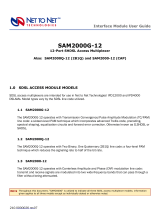 Paradyne SAM2000G-12 User manual
Paradyne SAM2000G-12 User manual
-
 Paradyne SAM2000G-12 User manual
Paradyne SAM2000G-12 User manual
-
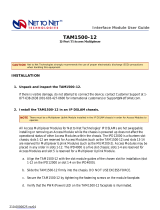 Paradyne 12-Port User manual
Paradyne 12-Port User manual
-
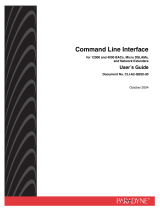 Paradyne 4000 Command Line Interface Manual
Paradyne 4000 Command Line Interface Manual
-
 Paradyne 4000 User manual
Paradyne 4000 User manual
-
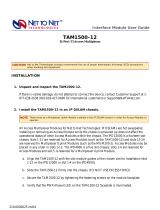 Paradyne 12-Port User manual
Paradyne 12-Port User manual
-
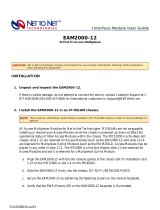 Paradyne 12-Port User manual
Paradyne 12-Port User manual
-
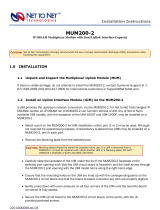 Paradyne DNE4500-S User manual
Paradyne DNE4500-S User manual
-
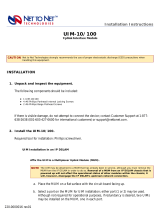 Paradyne UIM-10/100 User manual
Paradyne UIM-10/100 User manual
-
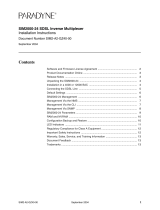 Paradyne SIM2000-24 Installation Instructions Manual
Paradyne SIM2000-24 Installation Instructions Manual
Other documents
-
Wildix W24FXS Quick Installation Manual
-
Zhone SNE2000G-P-US Datasheet
-
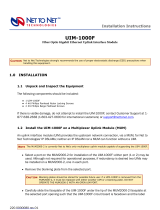 Net to Net Technologies UIM-1000 Installation guide
Net to Net Technologies UIM-1000 Installation guide
-
Zhone Technologies 4929 User manual
-
Dinstar DAG2500&DAG3000 Installation guide
-
Netcomm NCT1000 User manual
-
Dinstar DAG2500&DAG3000 Installation guide
-
Zhone SNE2000G-S-US Datasheet
-
Zhone Technologies 4800 Express User manual
-
APC IP DSLAM User manual




















